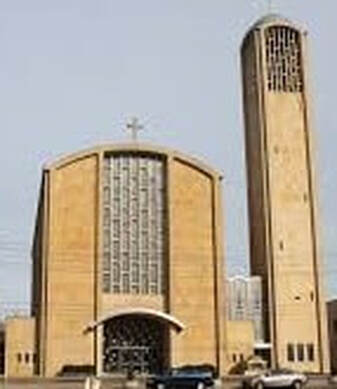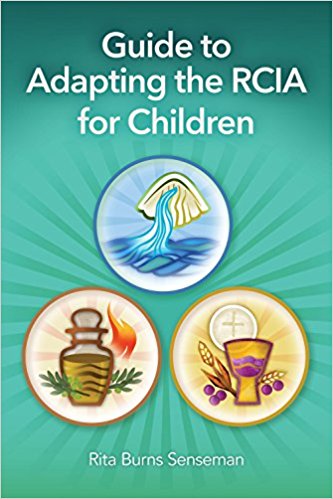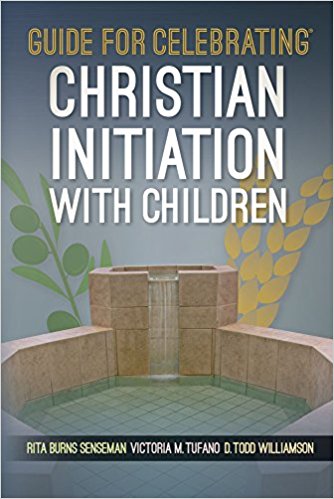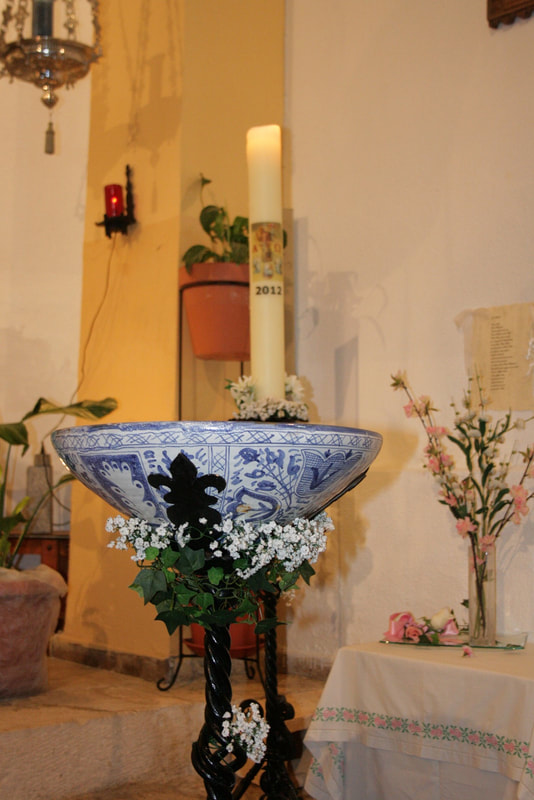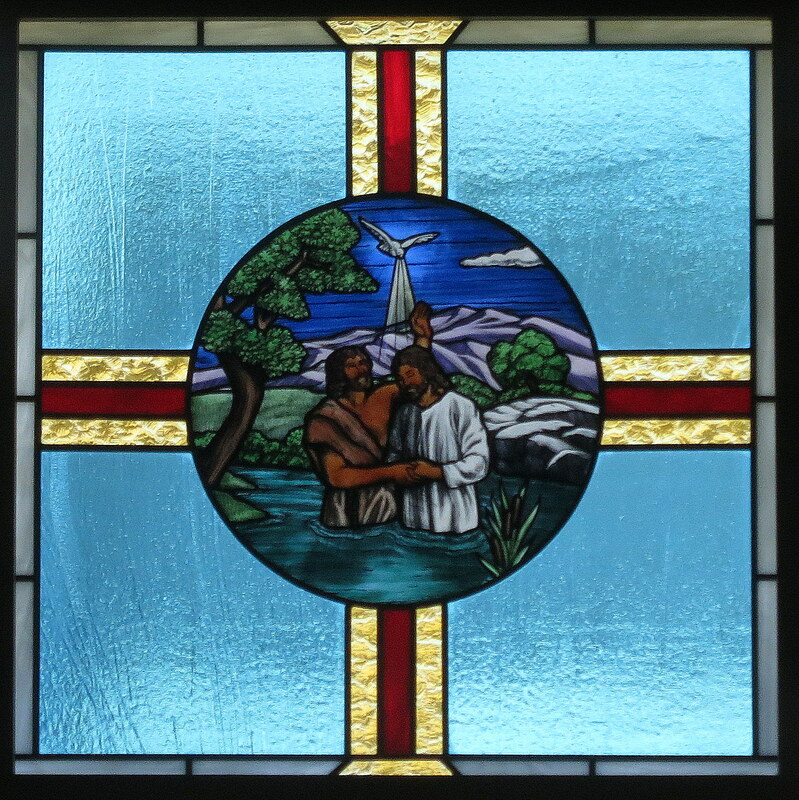Q.Who belongs in the RCIA?
A.The Rite of Christian Initiation of Adults is intended primarily for those adults and children of catechetical age who are not baptized. It may be adapted to include uncatechized adults who were baptized in another Christian Tradition and are now seeking full communion with the Catholic Church.
Do not automatically invite into the RCIA process a baptized Christian from another tradition who has been active in a faith community, has the habit of prayer and Sunday worship, is familiar with the bible, and lives a life of service. Such a Christian should be received into the full communion of the Church without participation in the RCIA. |
Q.How do we bring Christians from another tradition into the Church if we don't have them in RCIA?
A.Discern with them on an individual basis the appropriate path for doctrinal and spiritual preparation. The preparation should place on them no greater burden than necessary, and move them forward on their journey toward the Catholic life of worship, community, and mission. They should be received into the Church when they show readiness.
For a thoughtful article by Fr. Paul Turner on the advantages, practices, and implementation of this process for Christians entering into communion with the Church, CLICK HERE. The National Statutes of the RCIA say: "The reception of candidates into the communion of the Catholic Church should ordinarily take place at the Sunday Eucharist of the parish community, in such a way that it is understood that they are indeed Christian believers who have already shared in the sacramental life of the Church and are now welcomed into the Catholic eucharistic community upon their profession of faith and confirmation, if they have not been confirmed, before receiving the eucharist." |
Q.Isn't the RCIA a worthwhile process to catch up adult practicing Catholics who never celebrated the Sacrament of Confirmation?
A.The RCIA is certainly a beautiful and worthwhile process for people who are not yet Catholic, but it is not the right place for Catholics who missed a sacrament.
To carry on the conversations that need to happen with the practicing Catholic can easily derail what needs to happen with those who are not yet baptized or in communion with the Church. Honor the practice, formation, and experience of the Catholic who should enter into a different process to prepare for Confirmation. Use "Guidelines for Preparing Practicing Catholics for Confirmation" (Diocesan Directory for Catechesis, C-6). |
Q.What about people who were baptized Catholics but then didn't participate in religious education and never celebrated First Communion?
A.Yes, the RCIA is an appropriate process for baptized but uncatechized Catholics. They belong to the Church because of their baptism, but without having participated in the life, they need the RCIA process to initiate them into life in Christ.
The pastor must send a letter to the Bishop requesting permission to confirm the baptized Catholic. The Bishop will grant in writing the delegation to confirm. |
Q.Is the Rite of Election for everyone who's in the RCIA process?
A.The Rite of Election (for the unbaptized) and the Call to Continuing Conversion (for the baptized) on the First Sunday of Lent is for people who are going to celebrate the sacraments six weeks from then at the Easter Vigil.
If a person in the RCIA process isn't ready for the sacraments, whether they're still discerning their call or they need an annulment and don't have it yet, they should not participate in the Rite of Election. |
Q.How do we adapt the RCIA for children and youth ?
A.The RCIA Team and the whole parish community should introduce children and youth to the beauty of the experience of faith. When we shine in prayer, liturgy, learning, and works of mercy, and invite them to accompany us on the journey, we will lead them to the light of Christ.
Paragraph #253 of the Rite guides us: "The process of initiation...must be adapted both to their spiritual progress, that is, to the children's growth in faith, and to the catechetical instruction they receive." Therefore, we adapt what we do with adults. This adaptation may vary from child to child, depending on their needs and faith experience. These books, available in the diocesan library, can help: |
Q.Wouldn't it be better if children were confirmed with their peer group and not at the Easter Vigil when they're baptized?
A.Unbaptized children who have attained the use of reason (that is, they are "of catechetical age") are to be confirmed right after their Baptism at the Easter Vigil.
In the same vein, children who were Baptized into another Christian tradition who are being received into full communion are to be Confirmed at the same time as their reception. If the children are mature enough to willingly enter into their encounter with Christ in Baptism and Eucharist, then they are old enough (and entitled to) the fullness of the sacramental expression of Confirmation. When their peers are Confirmed at a later age, they can participate in the ceremony in special ways (such as reading, or altar serving). There is no reason to exclude them from that Confirmation service. THIS ARTICLE from TeamRCIA can help fellow parishioners understand the points of their usual objections. |
Q.Why can't the Easter Vigil be at the time of the usual Saturday vigil?
A.When we wait for complete darkness and light a fire that conquers it, everyone can understand the power of the light. Notice in the photos above that the flame against darkness stands out much more boldly than the flame against near-darkness. Words aren't even necessary to express a truth when we do this ritual right.
The Roman Missal states that, “the entire celebration of the Easter Vigil must take place during the night, so that it begins after nightfall…” The Priest Policy Handbook states that the Easter Vigil “is not to take place at the time of the ordinary anticipated Mass for Sunday,” (cf. Faculties and Permissions, Section V, pg. 10). Because daylight savings time begins in early March, the recommended start time of Easter Vigil will never be before 8 p.m. Parishes are therefore encouraged to begin the yearly practice of not scheduling the Easter Vigil before 8 p.m. |
Q.What's the difference between an RCIA sponsor and a godparent?
A.An RCIA sponsor is a spiritual companion to the person preparing for baptism. The sponsor should be a person of prayer who can listen to a catechumen and discuss the life of faith. A sponsor does not need to know all the answers, but willingly helps the catechumen find them. A sponsor accompanies the catechumen through the RCIA process up to the The Rite of Sending.
At that point, the sponsor may but does not have to become the godparent. Another person may step in at that time as godparent. A godparent stands up with the catechumen for the Rite of Sending, the Rite of Election, through Lent, the celebration of the sacraments, and through mystagogy. A godparent then helps the person "persevere in the faith and in their lives as Christians." (RCIA, paragraph #8) For a good article from Our Sunday Visitor with more detail, CLICK HERE. |
Q.What's the cut-off date for entering RCIA?
A.There is no cut-off date! Always welcome and accompany a person who inquires, and help them discern their call.
Always welcoming inquirers doesn't mean that you always have to have catechetical sessions ready to begin. There are other movements to the RCIA in which you can engage inquirers, such as invitations to prayer, to parish activities, to helping those in need. The Rite of Acceptance (for the unbaptized) or the Rite of Welcome (for the baptized) can be celebrated almost any Sunday of the year, taking into account the readiness of the inquirer and the scriptural focus of the given Sunday. A parish may need to celebrate these rites a few times a year. |
FOR THOSE BAPTIZED AT THE EASTER VIGIL:
Note the sacraments in the:
Note the sacraments in the:
- Baptismal Register, noting there that the person was confirmed (and, if desired, noting First Communion)
- Confirmation Register
- First Communion Register
FOR CHRISTIANS RECEIVED INTO THE CHURCH AT THE EASTER VIGIL:
Note the sacraments in the:
Note the sacraments in the:
- Baptismal Register, noting the date and church of baptism, and that the person made the Profession of Faith and was confirmed (and, if desired, noting First Communion)
- Confirmation Register
- First Communion Register
FOR MARRIAGES VALIDATED IN THE CATHOLIC CHURCH:
Note the marriage validation in:
Note the marriage validation in:
- Baptismal Register of the person baptized or received into the Church
- Baptismal Register of the Catholic parish where the spouse was baptized or received into the Church
- Marriage Register of the church where the marriage was celebrated
Q.Which baptisms do we recognize?
A.All of these traditions already share a baptismal bond with us. People baptized into these Christian communities DO NOT NEED TO BE RE-BAPTIZED:
The following communities have baptismal practices which are not uniform and REQUIRE AN INQUIRY INTO EACH CASE, to see if it was done with water and in the name of the Father, and of the Son, and of the Holy Spirit:
The following commonly encountered communities do NOT baptize with water and in the same name as we do:
If you don't find the baptism in question on the list here and aren't sure about it, please call the diocesan Office of Worship or Office of Religious Education (330-744-8451). |




